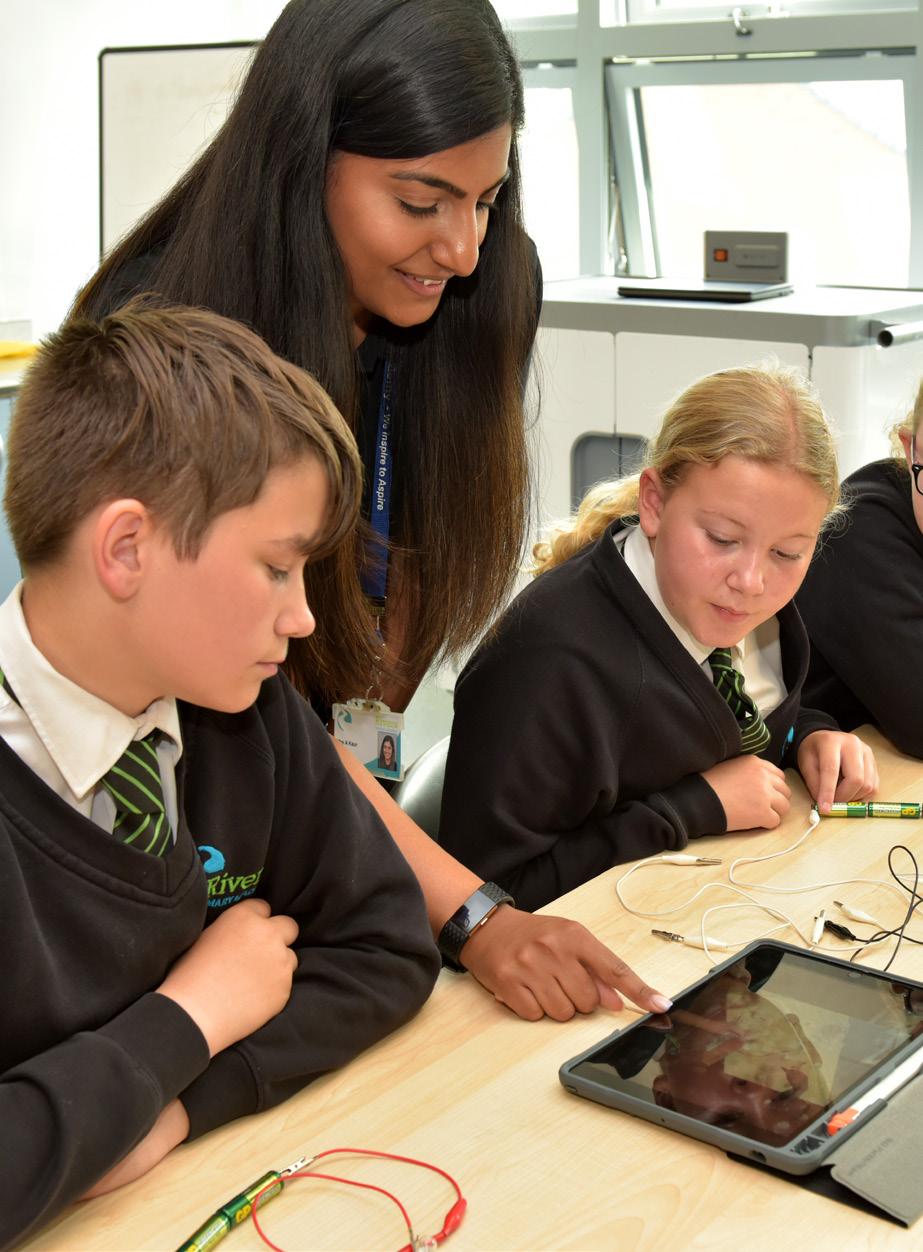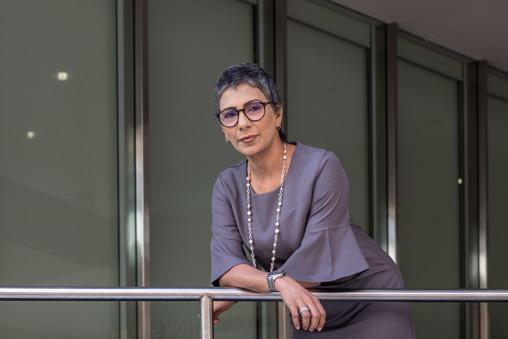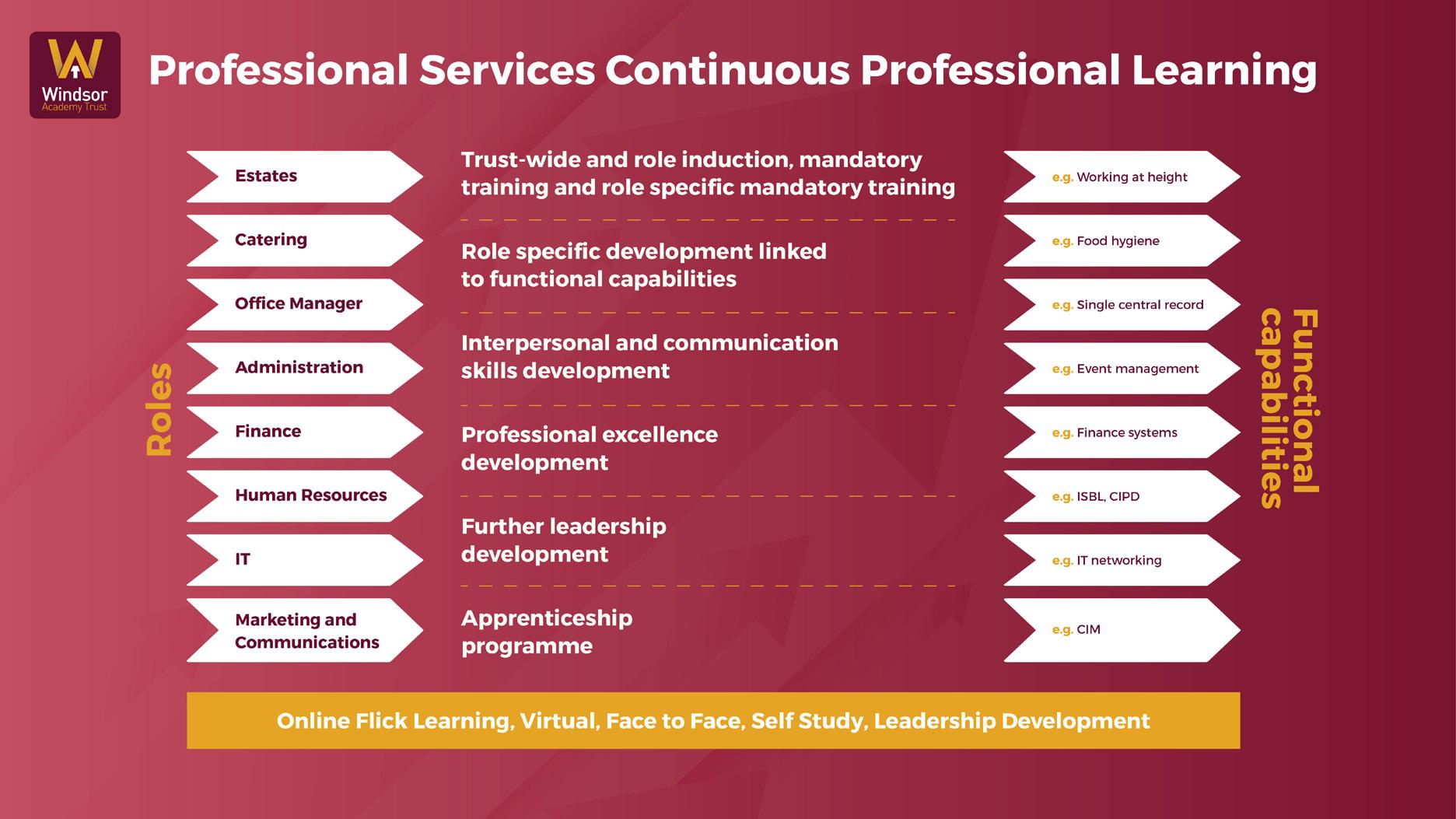








“It is through the development of the people in our schools that we unlock improvement.”
- Summary Report: School Improvement through Professional Development (Teacher Development Trust, 2020)
Building Staff Talent is one of WATs 5 ‘Big moves’, by developing inspiring, research informed staff.
Windsor Academy Trust (WAT) has developed exceptional teachers, leaders and professional services staff in schools for over a decade. We have an excellent reputation for delivering outstanding and innovative professional development across the Midlands and beyond. Our Trust family continually strives to be an employer of choice, and our sectorleading approach features as a case study in Sir David Carter and Laura McInerney’s book, Leading Academy Trusts: Why some fail, but most don’t.
Our approach to staff development is based on the belief that people are our most precious resource. This is demonstrated in how we support, develop, and retain the best staff, to achieve our moral purpose of unlocking students’ academic and personal potential across our family of schools. All staff across our Trust have an entitlement to equality of access to high quality induction and Continuing Professional Learning (CPL).
We believe that all staff should be involved in a continuing process of improvement and learning. We are committed to fostering and developing a culture of continuous learning for all of our workforce. CPL is the means by which we as a Trust or individual academies within our Trust are able to develop and motivate our staff community.
This development takes place at a number of levels: individual, team, whole school, trust wide and through wider networks.
Windsor Academy Trust believes that a carefully planned programme and a culture of CPL, improves standards, enables personal, school and trust growth, builds capacity, raises morale and assists with recruitment, retention and succession planning. We also ensure that we have effective measures in place to audit the professional and personal needs of staff. These measures are integrated into our appraisal system.
For teaching staff the focus of CPL is on improving standards and the quality of teaching and learning. We ensure that mechanisms are in place to disseminate good practice in CPL that supports and improves teaching and learning.
“There is no improvement for pupils without improvement in teaching, and no improvement in teaching without the best professional development for teachers.”
- Knowledge building - school improvement at scale (CST, 2021)
For Professional Services staff, CPL is provided with a focus on improving professional standards, ensuring up to date knowledge of specialist teams and the continuing rollout of best practice.

We strive to create a culture of CPL for all, by ensuring that:
• all staff are encouraged to develop their knowledge, skills, understanding and attitudes to enhance their professional work;
• all staff have regular opportunities to discuss their development needs and professional aspirations, for example through appraisals;
• all staff understand that they have a responsibility to participate in Trust and school focused CPL and personal career development.
Our CPL offering is not restricted within the walls of our own Trust. Sir David Carter reinforces the need to expand the scope, scale and reach of the leadership of a single school to the leadership of many and states the need for ‘the reach and influence of our best system leaders to extend way beyond the trust that they lead’.
One of our aims is to play a civic leadership role in supporting community development and educational improvement beyond our own schools. Through our extensive range of professional learning opportunities and open approach to sharing and collaboration with other schools, local authorities and school trusts, we are unlocking staff talent and enabling school improvement within and beyond the reach of our own schools.
The profile of the wider WAT opportunities is raised through encouragement to engage in cross-trust collaborative activities to build a collegiate mindset. We also engage with a range of professional learning networks, working with industry-leading partners, such as the Chartered College of Teaching and the Confederation of School Trusts, to deliver outstanding CPL across the Midlands.
WAT places great emphasis on the importance of CPL across our family of schools. Our staff surveys recognise how important and valued this investment is for individuals, allowing them to be confident in their roles and building a culture where we are all getting better all of the time.
We don’t do this for self-fulfilment, it is the significant impact on student achievement that drives the motivation and energy behind CPL.
But this outcome is hard to measure and can only be achieved through carefully designed programmes. It is for this reason that we have always focused on having clear underpinning principles behind the design of CPL principles that the research evidence tells us are those present in impactful programmes.

“Systematic research reviews are starting to build a newly detailed textured picture of the kinds of support school leaders need to provide to secure and maximise the benefit of high quality CPDL and link it effectively with school improvement.”
- Philipa Cordingley (2020)
According to Phillipa Cordingly (2020) et al, in their review of ‘Developing Great Leadership of CPDL’, we now know that effective leaders of great CPL do the following:
• Position CPL as shared responsibility for pupil achievement and wellbeing. Focus on teachers’ professional growth as well as developing knowledge/skills.
• Model openness to professional/leadership learning. Design structures/systems for managing complexity.
• Take fully into account the cognitive, practical emotional demands made by CPL approaches and systems.
Recognise and mobilise specialist contributions to CPL (including CPL expertise).
CPL needs are diagnosed on an individual basis for all staff, through the appraisal process, through the line management structure and through school CPL trackers. The school CPL trackers detail previous CPL undertaken for each member of staff along with future career aspirations and identified CPL for the year ahead. On a regular basis throughout the school year, the Trust CPL Lead in conjunction with school CPL leads and individual staff update the details of the CPL trackers to ensure relevant CPL opportunities are identified for each member of staff for the year ahead.

School Level Trust Level
Whole school CPL needs are linked to individual School Improvement Plans and are identified by individual school Senior Leaders and are coordinated by in school CPL Leads. Dedicated time for school focussed CPL is then calendared, coordinated, planned and delivered by school CPL Leads, as well as by other school Middle and Senior leaders.
Trust level CPL needs are aligned with the WAT strategy 5 big moves and are identified by the Head of Professional Learning and Talent in conjunction with other central Trust leaders and with school Senior Leaders and school CPL Leads. Dedicated time for trust focussed CPL is then calendared, coordinated, planned and delivered by the Head of Professional Learning and Talent, the Strategic Lead for Teaching and Learning as well as other central trust leaders, for example, WAT Subject Leads and Directors and the WAT IT Lead for Teaching and Learning.
The CPL ‘Types’ for teachers, professional services, leaders and all staff are our drivers which are utilised to build staff talent. All WAT CPL Types are underpinned by our CPL guiding principles and CPL mechanisms.











Mechanisms CPL Guiding Principles
WAT has developed a set of CPL Guiding Principles. The research that underpins this work goes back to systematic reviews from 2010 but most recently articulated in the TDT report “Developing Great Teaching”, 2014. We have used research to help us define, describe and exemplify the WAT codification of CPL.
• Rhythm and duration - There is rhythm and duration to CPL
• Starting Points - It build’s on individual’s starting points
• Collaboration - There is collaboration and working with peers
• Research Informed - We stand on the shoulders of giants
• Pupil Outcomes - Create clarity and sense of purpose by focussing on these
• Contextualisation - Make it real for your setting and context
Further details of our CPL principles can be found in the Codifying WAT CPL document.
We have a strong CPL culture across the Trust and CPL is a high priority for our organisation. Appraisal is used to identify, plan and review individual and school CPL needs. Teaching and Learning CPL needs are identified as part of School Improvement diagnosis. Each school has a CPL lead with responsibility for the CPL provision within their school.
We have a range of high quality CPL opportunities. In addition to this, the Trust’s arrangements for CPL aim to balance the judicious use of resources with the range of learning needs, aspirations and interests for all staff across our workforce.
Clear design approaches for all CPL will ensure the maximum effectiveness for the valuable time staff spend in continuous development activities.
The Education Endowment Foundation (2021) research report ‘Characteristics of Effective Teacher Professional Development’ outlines mechanisms that cognitive science tells us will enhance the impact of CPL.
Relevant mechanisms from each of the four groups have been carefully woven into our professional development programmes in order to ensure they have the greatest impact possible:
Building Knowledge
• Managing cognitive load
• Revisiting prior learning
Motivating Staff
• Setting and agreeing on goals Presenting information from a credible source
• Providing affirmation and reinforcement after progress
Developing Techniques
• Instructing staff on how to perform a technique
• Arranging social support
• Modelling the technique
• Monitoring and providing feedback
• Rehearsing the technique
Embedding Practice
• Providing prompts and cues
• Prompting action planning
Encouraging monitoring
• Prompting context specific repetition
The authors of the EEF report ‘Characteristics of Effective Teacher Professional Development’ suggest that a programme that features a mechanism from each of these areas above represents a ‘balanced design’. If one or more group is missing, the programme may fail.
The following EEF Mechanisms Audit is being used by the Trust Professional Learning Team and by in school CPL Leads to audit the various CPL programmes on offer across the Trust.



“If we create a culture where every teacher believes they need to improve, not because they aren’t good enough, but because they could be even better, there is no limit to what we can achieve.”
- Dylan Wiliam
The professional development opportunities available for our teachers across WAT are in line with our codified approach to Teacher and Learner effectiveness, outlined in our Teaching and Learning publication.




























A culture of lifelong learning and self-improvement is encouraged from the start through our Trust-wide staff induction. Here, staff learn about ‘What makes WAT WAT’ and are introduced to the extensive professional development opportunities available. This inspires staff to aim high and strive to be better every day in pursuit of the Trust’s moral purpose of unlocking academic and personal potential.

Developing WATs pipeline of excellent staff starts with our sixth form students. Some students know that they want to become teachers from a very young age, and we help them on their journey with our Aspiring Educators programme.
We offer several routes for aspiring teachers. This includes our School Direct programme, which sees trainee teachers learning their craft from school-based experiences across the WAT family of schools and growing strategic partnerships with the University of Birmingham and other teacher training providers.
Combined with our ‘incubator departments’ (excellent departments across the Trust with the greatest capacity to train and support early career teachers), these initiatives mean that our conversion rate of great trainees to fabulous teachers is growing year on year.
The Early Career Framework (ECF) launched in September 2021 and will support all new teachers during their first two years of teaching. The ECF is a set of entitlements to support the development of new teachers and is aligned to The Teacher Standards. It sets out what teachers should learn about and what they should learn how to do during their first 2 years. It is well known that the first years in any new profession can be challenging. The ECF recognises this and provides comprehensive support, specifically to new teachers.
“The early career framework (ECF) was designed to make sure early career teachers focus on learning the things that make the most difference in the classroom and their professional practice”
- Chartered College of Teaching
WAT has extensive experience in delivering programmes that support new teachers. To support early careers teachers, the Trust offers the ECF to it’s staff and early career teachers from other schools and school trusts and is a delivery partner with the University of Birmingham and Capita.
All of the professional development opportunities that are available to WAT staff are ‘underpinned by robust evidence and expertise; Include collaboration and expert challenge’ as advised by the Department for Education (DfE) standard for teachers’ professional development (2016). The following CPL Types are those which generate further research opportunities as well as being evidence based and research informed.
Pedagogy Champions: WAT provides vibrant, research-grounded, and practice-informed professional learning for teachers, leaders and professional services staff from across the WAT family and our external partner school trusts and schools. Our ‘pedagogy champions’ programme is one such opportunity available to our staff - circa 50 excellent teachers and professional services staff who engage with educational research, not just as consumers of academics’ research, but as generators of new practice-informed evidence.
Practitioner investigations are well placed to bridge the gap between academia and the classroom, by combining literature with practical expertise to find context-specific solutions. As Dylan Wiliam (2014) puts it ‘almost everything works somewhere, nothing works everywhere.’ Our staff have access to the fabulous research resources available from our partnership with the Chartered College of Teaching. They select ‘wicked problems’ across education to explore and identify workable and effective solutions.
The impact of these practitioner-researchers is published annually in a research journal (and celebrated and disseminated at a research showcase) and iteratively becomes more scalable and transferable across schools, year groups and subject areas.
Chartered Teacher Programme: WAT encourages our experienced practitioners to further engage in research-grounded, and practice-informed professional learning through the Chartered Teacher Programme with the Chartered College of Teaching.
“Achieving Chartered Status supports teachers’ personal, professional and career development and recognises the knowledge, skills and behaviours of excellent teachers.”
Perfect for teachers wanting to focus on and further develop effective classroom practice.
Masters in Educational Leadership: Some of our most effective teacher researchers, consisting of highly effective middle and senior leaders go on to join the University of Birmingham’s master’s level apprenticeship programme tackling trust-wide challenges and earning a Masters degree in Educational Leadership over two years.
Schools across WAT offer various bespoke whole school CPL opportunities, focussing on WAT codified approaches to Teacher and Learner effectiveness, aimed at meeting individual school needs, these include the following:
• Teach Meets
• Deliberate Practice
Trust, School, Faculty and Phase CPL sessions

There are various CPL opportunities for teaching staff to develop domain specific knowledge and expertise ranging from collaborative trust twilight CPL sessions to external exam board examiner and moderator training. Trust subject leads, subject directors and external specialists often lead subject specific professional learning sessions for teaching staff across the Trust.
WAT has recently designed and begun implementing an instructional coaching model to develop teacher effectiveness at all levels, working with national thought leader Jon Hutchinson to develop our programme. Instructional coaching is an individualised programme to support our teachers to become ‘even better’, or, as Peps Mccrea (2018) puts it, moving our teachers along the spectrum of proficiency towards mastery.
Kraft et al (2018) identify instructional coaching as an essential feature of professional development that facilitates ‘teachers’ ability to translate knowledge and skills into actual classroom practice’. At the ResearchEd national conference in 2018, Dr Sam Sims argued that instructional coaching is ‘currently the best-evidenced form of professional development we have. I have looked hard at the literature and I cannot find another form of CPD for which the evidence is this strong’ (Sims, 2019).
Steve Farndon, Fellow at Ambition Institute, also shares this view: “In terms of impact on student outcomes, instructional coaching has a better evidence base than any other form of CPD.” Steve Farndon (2019)
Windsor Academy Trust is committed to offering a programme of lifelong learning for our staff and provides a progressive pathway of leadership development opportunities for teaching and professional services staff, many of which are externally accredited and which offer every leader the opportunity to be supported throughout their journey.
It is essential that our middle and senior leaders are equipped with the right skills, knowledge and behaviours to fulfil their responsibilities. It is part of the role of the in-school CPL lead to

Leadership Development Programmes
Creating outstanding teachers and leaders.






‘What makes a WAT Leader’ is a programme aimed at “Powering Up” our Senior Leaders


WAT is a delivery partner with the Teacher Development Trust to deliver the reformed suite of National Professional Qualifications. We work collaboratively with the national lead provider, partner school trusts, other schools and Teaching School Hubs to offer these highquality leadership development programmes for staff regionally and nationally.





across the Trust and is focussed on what makes WAT, WAT. We codify our WAT way for leadership, this starts with looking at WHY we exist, linking to our moral purpose of unlocking students academic and personal potential.
We look at WHAT we do, through ‘WAT way’ codified approaches and then break down leadership to look at HOW we lead, in line with our Trust values of Pride in Excellence, Respect, Responsibility, Collaboration and Bold and Innovative. Finally, we deconstruct HOW we succeed, through the WAT approach.

Our Professional Services staff provide essential support that ensures our schools thrive.
Professional Services staff benefit from a holistic continuous professional learning programme that enables staff to develop role-specific capabilities, professional excellence, leadership skills and essential business skills, such as interpersonal and communication skills.
Role specific opportunities cover the following functions:
Administrative skills
• Finance skills
• Human resources
• Estates team development
• IT and wider technology.
Central, trust based Heads of these functional areas identify mandatory, essential and desirable role specific training opportunities that Professional Services staff within their function should undertake, as well as opportunities to develop leadership skills. Further opportunities to take advantage of various apprenticeship programmes are also available, where appropriate.

There are a range of development opportunities that are available for Professional Services staff in a variety of roles. A wide range of online programmes have also been sought which come from different sectors beyond the world of education. Some of the CPL opportunities include:

• IT Skill development including G-Suite applications. These cover Drive, Gmail, Hangouts, Meet, Docs, Sheets, Slides and Forms. Other IT training opportunities include Microsoft tools and digital basics with courses on Social Media or Digital Marketing.
• Interpersonal and Communication skills courses, including Listening Skills, Emotional Intelligence and Stress Management.
Customer Service training courses.
• Management skills training courses including Developing Effective Teams, Managing Difficult and Challenging Conversations, Wellbeing at Work, Confident Public Speaking and Equality and Diversity.
• Planning and Organisation courses including Business Administration, Effective Time Management and Organising and Running Effective Meetings
• Human Resource courses including HR Fundamentals and Safer Recruitment.
We place great value upon collaboration and collegiality and empower our teaching staff to be hunter gatherers of excellence. A prime example of where colleagues from across the Trust join forces to share best practice and celebrate pedagogical successes, is at the Windsor Academy Trust annual conference, where we bring together staff from across all nine schools and guests from other school trusts and national organisations.
Staff have the opportunity to attend inspiring and innovative talks from world-class speakers in the world of education. Staff are invited to visit an exhibition hall, which includes a range of our sponsors and partners as well as WAT Practitioner and Leadership research.
Apprenticeships
Apprenticeships can be used to support staff at all stages of their career, not just those entering the career market. WAT seeks to meet all targets for apprenticeship recruitment as well as providing outstanding CPL opportunities for current staff utilising apprenticeship levy funding.
For example, WAT provides access to a wide range of role specific apprenticeships for Professional Services staff through a number of national and expert providers. Plus, in conjunction with the University of Birmingham,
WAT supports staff to access degree-level apprenticeship programmes which allow staff to develop their skills tackling trust-wide challenges whilst achieving a Masters in Educational Leadership or Business Administration.
In addition to developing professional skills, the Trust is committed to promoting and enhancing staff wellbeing. There is a long-term strategy for improving staff mental, physical and emotional wellbeing through resourcing, support guidance and professional learning aligned with the DfE Education Wellbeing Charter. Staff have access to an excellent collection of online resources that provide strategies and guidance to manage wellbeing.

One of WAT’s core strategic aims focuses on accelerating staff talent. This ensures a pipeline of excellent and talented staff who have the capacity and capability to drive school improvement and create their own self-improving system. The WAT Talent Centre is our central hub for CPL opportunities which are made available for everyone across our Trust and beyond, as well as specific opportunities for building and accelerating staff talent across our Trust.
Unique opportunities to accelerate staff talent are provided through WAT Associate roles. These roles enable talented staff to take a sabbatical (one day per week for a year) from their role to bring their talents to critical trust-wide developments such as enhancing the Trust’s digital learning strategy or embedding character education. This generates fresh and innovative approaches and encourages staff to have an outward-looking perspective, building system leaders of the future.

The following strategic WAT enablers underpin the Big Move of Building Staff Talent.
Professional development website: Staff have access to an extensive range of internal and external resources through WAT’s dedicated professional development website. The website is an essential training tool that covers all areas of learning, from teaching and leadership development to interpersonal and digital skills, such as time management and Google apps training.
A creative and flexible approach to learning is adopted, with staff able to learn at a time and in a way that suits them best. This is achieved by providing learning opportunities in several formats, including online, face-to-face, and blended.
One-to-one iPads: WAT has started a journey towards all students and staff having a one-toone iPad. All students in years 4, 5, 7, 8 and 9 currently have a personal iPad alongside staff that teach these year groups. Teaching staff across the Trust have access to ongoing high quality Apple training.
IRIS technology: IRIS technology enables teaching staff to review and reflect on their pedagogy and provides a valuable tool for instructional coaching conversations as well as an effective tool for sharing best practice across the Trust in relation to modelling effective pedagogy.
Innovation: We continuously strive to build innovation into our CPL programmes and continue to create innovative, collaborative platforms for innovation to be shared.
Research: All staff are supported to be consumers and generators of research. The WAT Research Lead empowers and equips staff in this area.
We continue to build research into staff CPL and enable staff to engage in the pedagogy champion programme, the Chartered College of Teaching Chartered Teacher Programme and Masters degree programmes. We continue to build links with universities and academic researchers.
Utilising expertise: We utilise both internal and external expertise to support the development of various CPL programmes. Examples include training of internal staff to facilitate the NPQ suite of programmes and coaches to support our internal programme of Instructional Coaching.
External expertise such as the likes of Jon Hutchinson, Director of Training and Development at the Reach Foundation, have been utilised to deliver training to our Trust wide team of Instructional Coaches. David Weston, CEO of the Teacher Development Trust (TDT), has supported CPL Leaders across our Trust to ensure effective leadership of impact led CPL.

We can measure the desired impact of the CPL that we offer across WAT by utilising Thomas Guskey’s Levels of Impact. Guskey suggests that there are 5 ‘Levels of Impact’ that we should use, these include:
1. Participant Reactions - using dialogue and surveys
2. Participant Learning - planning, dialogue and assessment
3. Organisational Support - policies, schemes, agendas
4. Participant Practice (use of learning) - video, observation, interview
5. Pupil Learning/Outcomes - tests, books, pupil talk.
Quotes from some of our Early Career Teachers and Mentors following the ECF programme:
“My developed knowledge of memory will be very useful in my long term and short term planning.”- ECT
“My mentee and I have identified steps that really will support her to effectively develop in her role as a teacher, using the instructional coaching model.” - Mentor
Quotes from some of our staff who are participating on the new NPQ programmes:
“My leadership training has provided extra capacity and efficiency within SLT and promoted professional conversations. We have become much smarter in our outcomes for all leaders.”- NPQSL graduate
“In applying for headship and through the interview process I drew on so many aspects of learning from the NPQH and our final session has given me a great toolkit for the start of September.” - NPQH graduate
With a 99% pass rate for previous National Professional Qualifications completed with Windsor Academy Trust to date.

Summary Report: School Improvement through Professional Development. (2020). Teacher Development Trust (TDT).
Knowledge building - school improvement at scale. (2021). Confederation of School Trusts (CST). Leading Academy Trusts: Why some fail, but most don’t. (2020). Sir David Carter and Laura McInerney.
Developing Great Leadership CPDL. (2020). Prof. Philippa Cordingley, Prof. Steve Higgins, Prof. Toby Greany, Bart Crisp, Evangelia Araviaki, Prof. Rob Coe, Paige Johns.
Developing Great Teaching, Lessons from the international reviews into effective professional development. (2014). Teacher Development Trust (TDT).
Early career framework, A framework of standards to help early career teachers succeed at the start of their careers. (2019). Department for Education (DfE).
Standard for teachers’ professional development: Implementation guidance for school leaders, teachers, and organisations that offer professional development for teachers. (2016). Department for Education (DfE).
Principled assessment design, SSAT. (2014). Dylan Wiliam.
Chartered Teacher Programme. (Online). https://chartered.college/chartered-teacher/
Expert Teaching What is it, and how might we develop it? (2018). Peps Mccrea.
The Effect of Teacher Coaching on Instruction and Achievement: A Meta-Analysis of the Causal Evidence. (2018). Matthew A. Kraft, David Blazar, Dylan Hogan.
Four reasons instructional coaching is currently the best-evidenced form of CPD. (2019). Dr Sam Sims. What is instructional coaching? (2019). Steve Farndon.
Characteristics of Effective Teacher Professional Development. (2021). Education Endowment Foundation (EEF)
Evaluating Professional Development. (2000). Thomas Guskey.

